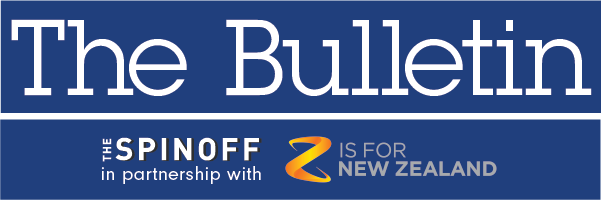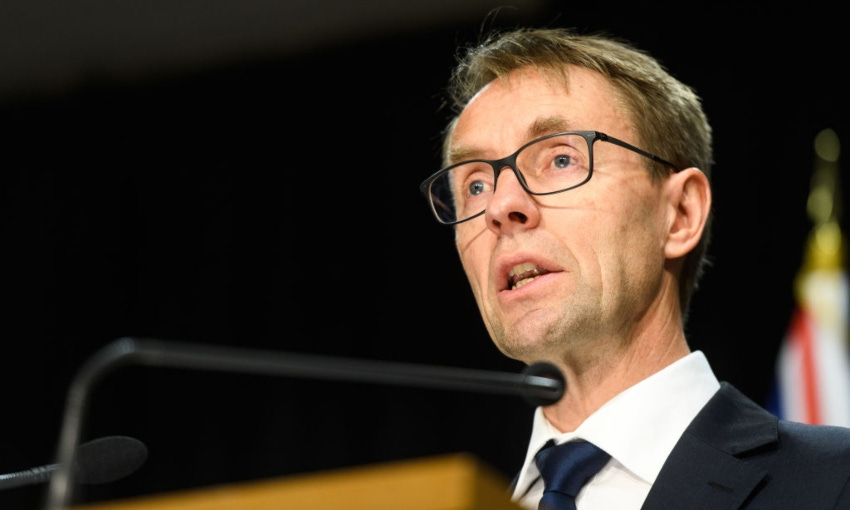How we'll learn what happens next
By the end of the day, we'll know how severe the restrictions will be

Good morning and welcome to The Bulletin for Friday 14 August, by Alex Braae for The Spinoff. Presented in partnership with Z Energy.
In today’s edition: Timeline for decision on alert levels released, updates on new cases and testing, and a failure of testing at the border has potentially severe consequences.

Image: Dr Ashley Bloomfield will give a purely health focused update at 1pm today (Getty Images)
Right now, we don't know what the situation around alert levels will be at the end of the day. There was no change in the provisional alert levels at yesterday's update – it remains at level three for Auckland, and two for the rest of the country. However, we have been given a guide for how the day will go, and when relevant announcements will be made.
At this stage, the 1pm briefing will be conducted by Dr Ashley Bloomfield alone. He will update case and testing numbers, and give a lot of the other sort of health information that would normally happen. Without pre-empting what gets said, some crucial bits of information to watch out for will be whether there are cases of community transmission outside of the existing cluster, and whether new cases have appeared outside of the Auckland region. As of yesterday's briefing, the ministry was still yet to identify the 'index' (source) case for this particular cluster, so that too will be relevant.
Following that update, cabinet will convene in a combination of in-person and over zoom, and discuss the information. Their decisions could go in a number of different directions. For example, other regions could be moved into level three if cases are identified, or the country as a whole could move up a level. Or the existing levels could be extended for a certain period of time. Or the levels could be relaxed if it looks like it really is all under control – we just don't know. Those decisions will be announced at a press conference fronted by the PM at 5.30.
Could a full-blown level four lockdown happen? It exists as an option that can be used if necessary, but at this stage seems unlikely. That's based on comments from finance minister Grant Robertson, who last night told Three show The Project "we’ve got no plans to go to level 4 at this stage. As long as everyone does the right thing in Auckland, at level 3 and around the rest of the country in level 2, then we should be able to get on top of this outbreak." Either way – and I say this with absolutely no inside knowledge of what will happen – it can't hurt to mentally prepare yourself for the possibility of longer restrictions. We'll keep you posted across the day through our live updates.
As for those new cases yesterday: There were 13 new cases linked to that cluster that emerged earlier in the week – however to reiterate, there are still no known cases of community transmission outside of that cluster. All of the details of those cases are in our live updates – scroll down to 1pm. We also saw a massive expansion in testing, with Auckland in particular setting a new daily record. In terms of those who test positive, it was also announced that they will be moved to quarantine facilities, rather than being sent home to self-isolate. Around Auckland, four medical clinics are currently closed due to a person who tested positive having been there, reports First Up.
A failure of border security with huge potential ramifications: Newshub's Michael Morrah has revealed that as of a week before the community outbreak, almost two thirds of all border and hotel isolation workers in Auckland had never once been tested. They're in the jobs with the highest risk of contracting the virus, and yet the testing just hadn't happened, in part because it was voluntary. The PM has since said it will now be compulsory. Meanwhile, deputy PM Winston Peters has told Australian news that he believes the outbreak stemmed from a quarantine system breach, reports One News. To be honest, it's pretty strange to have the second-most senior figure in the government sharing unverified rumours about an evolving emergency situation with overseas media.
Act leader David Seymour has criticised the level three conditions which prevent many butcher and greengrocer stores from operating, reports Newshub. This was a live issue during the last lockdown too, with many small operators saying it was an unfair restraint on their ability to trade in a safe way, particularly while supermarkets remain open. PM Ardern disagreed, saying it was in the best long term economic interests of the country to make the health response as effective as possible.
Some commentary to read about the rhetorical tactics employed by National's deputy leader Gerry Brownlee, in noting the 'interesting' facts and timing around the re-emergence of Covid-19 after the government had spent more than a week issuing warnings of just such a scenario. Newsroom's Sam Sachdeva says it takes political discourse in a "dark direction", suggesting they might be stoking suggestions of a conspiracy for political gain. The Spinoff's Duncan Greive picked up on a similar theme, particularly honing in on how trust in institutions had served the country exceptionally well during the last outbreak. And freelancer and conspiracy specialist David Farrier just tore into it all, saying Brownlee was adopting the techniques used by the likes of QAnon groups.
A fascinating story from the foreign entertainment press about the impact the second wave could have on the local film industry: Variety has reported on whether these new cases will dent the projects currently being filmed here, particularly with regards to Hollywood projects that can't really be filmed anywhere else. It's a sector that is also looking at expansion right now, so getting through this period is likely to be crucial for maintaining that confidence.
It has been something of a week of cool project announcements, and I'm excited about this one too. The Spinoff is launching a new show called Youth Wings, made with the support of NZ on Air, following a key member of the youth branch of each party in parliament. Starting next week, there will be daily episodes released, culminating in a debate between all of them. You can watch the trailer and meet the contenders here, and having seen some of the footage going into this, I can say it's going to be a hell of a watch.
And of course Policy, glorious Policy. We announced this yesterday, and so far there has been a really heartening response to it. If you didn’t see it, Policy is a remarkable tool for elections that captures what candidates stand for, wherever they are and whichever party they're part of. Here's a launch post explaining more by Toby Manhire, but because it works so intuitively, it's almost better to just jump in and start exploring.
Got some feedback about The Bulletin, or anything in the news?
Drop us a line at thebulletin@thespinoff.co.nz

Right now on The Spinoff: Danyl Mclauchlan games out why National might be launching into conspiracist territory with some of their statements this week. Laura O'Connell Rapira discusses how to talk to whānau who have gone down the rabbit hole on topics like 5G, agenda 21 and vaccines. Tara Ward reports on a TV drama about lockdown being postponed, because it was due to start screening as soon as we actually went into a form of lockdown. Leonie Hayden writes about protecting mental health during said lockdown.
And in other topics: Alice Snedden introduces episode two of Bad News, in which the topic is the Trans Exclusionary Radical Feminist, or TERF movement. And Kirsten O’Regan has a remarkable essay written from her home in Beirut, where the recent disaster has sent many into deep despair.
For a feature today, a genuinely informative and useful piece about preventing a common cause of accidental death. Many people have very little understanding of what it actually looks like when a person is drowning, but this piece from Slate outlines what it looks like in real life, rather than the movies. Here's an excerpt:
How did this captain know—from 50 feet away—what the father couldn’t recognize from just 10? Drowning is not the violent, splashing call for help that most people expect. The captain was trained to recognize drowning by experts and years of experience. The father, on the other hand, had learned what drowning looks like by watching television.
If you spend time on or near the water (hint: that’s all of us) then you should make sure that you and your crew know what to look for whenever people enter the water. Until she cried a tearful, “Daddy,” she hadn’t made a sound. As a former Coast Guard rescue swimmer, I wasn’t surprised at all by this story. Drowning is almost always a deceptively quiet event. The waving, splashing, and yelling that dramatic conditioning (television) prepares us to look for is rarely seen in real life.
After such high hopes going into the resumed season, the Phoenix are limping into the A-League playoffs. Last night, they were comprehensively thrashed on the scorecard by the Newcastle Jets, despite playing reasonably well, reports Stuff. The result means they cannot finish outside the top four – but a few weeks ago, 2nd place and an easier run towards the final was the clear goal.
That's it for The Bulletin. If you want to support the work we do at The Spinoff, please check out our membership programme




